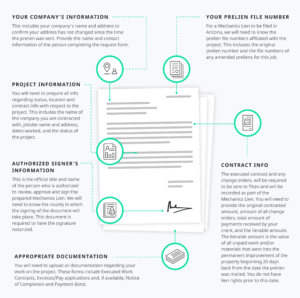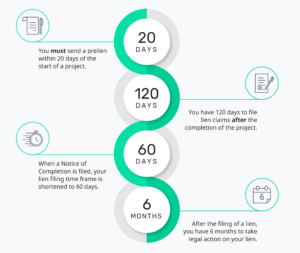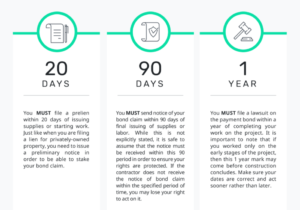What Does An Arizona Mechanic’s Lien Do?
A mechanic’s lien is a legal tool that gives unpaid contractors a security interest in the property that they worked on without pay. As a contractor, it’s important to be educated on the lien laws in your state to ensure that your lien rights are protected and that you are getting paid for your work!
Who Can File An Arizona Mechanic’s Lien?
- Direct contractors
- Subcontractors
- Material suppliers
- Laborers down to second-tier subs
How to Prepare an Arizona Mechanic’s Lien
As a contractor, it’s important to be educated on the lien laws in your state to ensure that your lien rights are protected and that you are getting paid for your work! To file a Mechanic’s lien, sign up with Titan Lien Services. We’ll take the reins from there, and do all the heavy lifting on your behalf. The infographic below explains what information you’ll need to prepare

Arizona Lien Deadlines:

How to File a Mechanic’s Liens Work in Arizona for Public Property?

As a contractor or material supplier, it is important to know what your options are for protecting your income when working on any project. When it comes to publicly-owned property, filing a mechanics lien on the project isn’t an option, but you may be able to file a Bond Claim.
What is a Bond Claim?
Just like a mechanics lien (which is used only for privately-owned properties), bond claims are used to ensure payment when working on publicly-owned or government properties. A payment bond is usually issued by an insurance company or financial institution at a state-determined value.
Common Mechanic’s Lien Mistakes that Arizona Contractors Make
When filing your Mechanic’s Lien, it is in your best interest to have an airtight lien filing experience. Plenty of people may try to fight a lien, and they’ll be diligently looking for any mistakes you’ve made along the way in hopes of invalidating your lien rights. Learn from others’ lien filing mistakes, and arm yourself with information on what to avoid when it comes to mechanic’s liens.
- Not understanding your lien rights
Before filing, make sure you have followed the state requirements to ensure you have lien rights. There are several factors to consider, including if you need a valid contractor’s license, notice requirements and how they are served, and doing it all within the strict time frames set by each state.
- Incorrect forms with missing or inaccurate information
Accurate property descriptions are essential, and this means more than just getting the address right. If you are unsure of an exact address, provide a parcel number or use an aerial map, to provide a visual of the property being improved. Ensure that all other information provided is accurate.
- Missing the deadline to file
Liens must be filed before their deadline, otherwise you’ll lose lien rights. Refer to state statutes to know those deadlines or consult your legal counsel.
- Not sending required notices
In many states, contractors may be required to send a preliminary notice, notice to owners or notice to general contractors, notifying relevant parties of their involvement on the job. Some states have Intent to Lien requirements before filing a lien.
- Misapplying lien practices you’ve heard from other contractors
It’s important to note that lien laws differ state to state, so be sure you are not working off what you “heard from another contractor,” who may be working under different state law.
- Filing on your own without a professional firm
There’s no shortage of red tape in the lien filing process. A professional lien services firm can help you avoid these mistakes. The smartest move a contractor can make is to not go at it alone.
